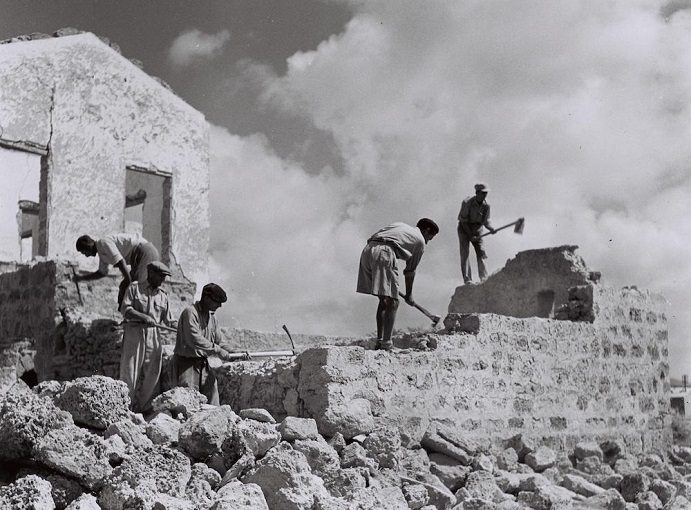
+972 Magazine / July 7, 2019
Israeli authorities are deliberately concealing historical documents to undermine evidence of the state’s dark and violent origins. And the world is still falling for it.
The village of Safsaf (“willow” in Arabic) appears on page 490 of the newest edition of Walid Khalidi’s All That Remains, a seminal book that catalogues 418 Palestinian communities that were destroyed and depopulated during the Nakba. A Palestinian eyewitness account describes the day when Zionist forces conquered the village and rounded up its residents in October 1948:
As we lined up, a few Jewish soldiers ordered four girls to accompany them to carry water for the soldiers. Instead, they took them to our empty houses and raped them. About seventy of our men were blindfolded and shot to death, one after the other, in front of us. The soldiers took their bodies and threw them on the cement covering of the village’s spring and dumped sand on them.
On Thursday, Haaretz published a widely-shared investigative piece by Hagar Shezaf on how Israeli authorities are systematically concealing archival materials relating to the 1948 war, even after they have been officially disclosed. It begins with an Israeli historian stumbling upon a document four years ago that was written in November 1948 by the Haganah’s former chief of staff. The note, which was first unearthed by New Historian Benny Morris in the 1980s, is also quoted in Khalidi’s book:
Safsaf – 52 men were caught, tied them to one another, dug a pit and shot them. 10 were still twitching. Women came, begged for mercy. Found bodies of 6 elderly men. There were 61 bodies. 3 cases of rape, one east of Safed, girl of 14, 4 men shot and killed. From one they cut off his fingers with a knife to take the ring.
It is strangely consoling to see official Israeli admission of the event. As Shezaf’s excellent article shows, and thanks to the vital work of Akevot – an Israeli organization that works to expand public access to documentation about the conflict held in government and private archives – along with other historians, archive research has made it irrefutably clear that Zionist forces consciously carried out brutal acts of violence against Palestinians to facilitate their expulsion.
Though this is hardly news, such archives remain valuable in providing what are essentially “confessions” by officials of the inhumane crimes they oversaw – crimes that are denied by Israel and its supporters to this day.
Yet, for many Palestinians, the bewildered reactions to these discoveries can be infuriating. They remind us of how thousands of Palestinian testimonies, and decades of Palestinian-led research, struggle to stir so much as a ripple in mainstream discourse about Israel’s history. A few Israeli documents, however, can swiftly rile up a storm.
The knowledge of this disparity has been a key reason for Israel’s obstinate archive policy: as one official blatantly told Shezaf, authorities deliberately continue to hide these documents in order to “undermine the credibility of studies about the history of the [Palestinian] refugee problem.” And many still fall for it.
This cruel double standard over who has “permission to narrate” the conflict has been raised before – and, it seems, it must be raised again and again.
The world should not have to constantly catch up to what Palestinians have always known about the Nakba. Many Palestinians reading about Safsaf in Haaretz would have reached for their copies of All That Remains or other collections, correctly assuming they would find the same facts recorded years before. Descendants of Safsaf’s survivors would likely know the harrowing story by heart, having heard it from their grandparents’ own lips. Like all settler-colonial states, Israel fears the ghosts of its dark and violent origins. Palestinians are those living ghosts. Listen to what they have to say.
Amjad Iraqi – I’m a Palestinian citizen of Israel and have lived between Israel-Palestine, Kenya, and Canada. I’m an advocacy coordinator at Adalah, a policy analyst for Al-Shabaka, and a contributing editor at +972 Magazine. Currently in Haifa. Views here are my own.





![vrijdag 17 mei in Amsterdam: in gesprek [videoverbinding] met Palestijnse arts Ghassan Abu-Sittah](https://palestina-komitee.nl/wp-content/uploads/2024/04/abu-Sittha-1-1-218x150.png)






